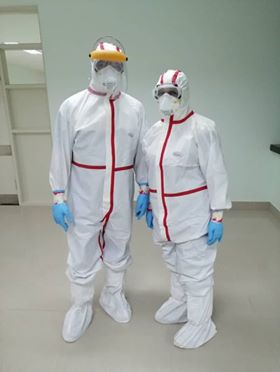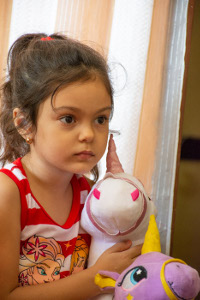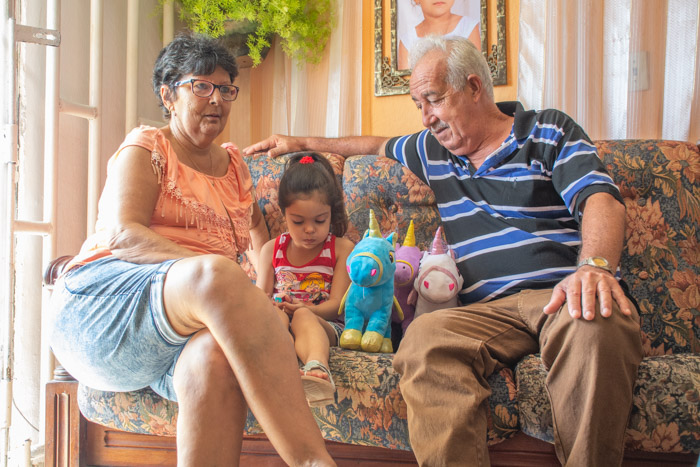CAMAGÜEY.- Those who read about Eliecer Ruiz Corvea and Onelia Expósito Gutiérrez, he, founder of the Maximum Gómez Báez Vocational School, with just 22 years old, and she has been a teacher of the same school since she was very young, would believe that the topic will be about their experiences, which have it well-deserved. However, this dialog with the physics teacher (Pipo, for his students) and the one in Spanish and Literature - with 43 years of a beautiful marriage for which they dispute who deserves the gold medal - addresses another of its dimensions.
Both hold three passions: that "Vocational", her daughter Yulién, and her granddaughter Annalieth, who at two and a half years old was placed under the shelter of grandparents because her parents, doctors Yulién Ruiz Expósito and Carlos Enrique Arévalos Tan, went to Bolivia to fulfill their second internationalist mission.
Both specialists were previously in Venezuela. She is 1st degree specialist in Internal Medicine and he is 1st and 2nd degree in Intensive Care Medicine and Adult Emergency, and holds a Master in Medical Emergency.
"She left for Venezuela at the age of 22," said Onelia, she had just graduated and it was difficult, she is our only daughter and we had never separated. She was there for four years. When she came back, she had already finished a year of her specialty, Anesthesiology and Reanimation, because it was given to her before her departure.
"Here she ended up at the university hospital Manuel Ascunce Domenech, got married, and after having the girl she started at the oncological hospital Maria Curie. Her husband was already in the Plurinational State of Bolivia when that mission came to her. She left in May, a Mother's Day. It was a double separation because although Mother's Day is everyday, tradition always imposes special feelings."
Onelia and Eliecer find no proper words to define how much they spent in the aftermath of the coup d'état in Bolivia when Cuban doctors were expelled from the country by the de facto government. "It is difficult to revive that event," the mother said, confessed her inability to describe her fears and insecurities. The father confirmed his great pride and reverence for his daughter. He says it doesn't matter to him that enemies call them slaves because they are not able to value them in their full dimension. "I admire in her and in my son-in-law the attachment to the principles of serving others."
 Time has become difficult once again, not only because of the remoteness, but also because of the COVID-19 pandemic. Now they are in Angola, in Luanda, the epicenter of the pandemic in that country. They are kept in Barra do Kwanza hospital, as part of the Henry Reeve Brigade.
Time has become difficult once again, not only because of the remoteness, but also because of the COVID-19 pandemic. Now they are in Angola, in Luanda, the epicenter of the pandemic in that country. They are kept in Barra do Kwanza hospital, as part of the Henry Reeve Brigade.
"We took care of the girl again, this health situation appeared and they both are doctors, they respond to a very committed career and we grandparents not only have to take care of the girl, but educate her at the same time, inculcate values without mom and dad, it's not easy, but we did it," says Onelia.
"And yes I am proud of my daughter, a fulfilled professional because I know she likes what she does and that is the most important, she does it with love and dedication, even it gives me desire to weep.; and so does her husband, both of them love their profession, when we talk and they are in the red zone with some serious patient, they try as if they were their own family, and after the end of the week without deceased, they feel pleased. That's the struggle of both. This way they fulfill the cycle of work, they protect themselves and they avoid infection."
The father says proudly: "My daughter, as a professional and member of the Henry Reeve contingent, brings health to those most in need, she has always stood up, and to the Empire's farce that Cuban doctors are slaves, we tell her with all the honor that assists us that such offense does not hurt us because those who have to recognize them are the peoples, the most disadvantaged. They do what these governments have not been able to do.
"It is a pity and shame, for example, that a country as developed as the United States of America only targets others, its economic interests, and not to protect the health of its people.
"I feel satisfied with my daughter, as a person she has wonderful relationships, a fundamental link of a doctor, being sensitive and human. She lives proud of her profession and by her principles is able to go to the place where they need her because she is formed in this country, under the aegis of Fidel."
 They both recognize Annalieth's parents’ mission to COVID-19 as strong and risky in a country on the African continent, but they feel confident about their ability to be professionals and are serene because they will not only be able to protect themselves and return safely, but are satisfied with having many people out of the clutches of death. They also have references that the security measures taken are optimal and that their Angolan counterparts are closely related to them.
They both recognize Annalieth's parents’ mission to COVID-19 as strong and risky in a country on the African continent, but they feel confident about their ability to be professionals and are serene because they will not only be able to protect themselves and return safely, but are satisfied with having many people out of the clutches of death. They also have references that the security measures taken are optimal and that their Angolan counterparts are closely related to them.
Because of all this and more these brave and indispensable grandparents-parents changed a bit of their passions. Now they are teachers in Nicolás Guillén School of Teaching. They are close to home and can dedicate more time to little Annalieth. They assure that they will do their utmost to get the passionate teacher needed from each of their students.
Yulién's family is just one of many who in Cuba are ready to help their children and grandchildren, and they also contribute so that patients in this country and in others feel a helping hand. Those who have gone elsewhere or made themselves available to the sick in Cuba have been described as brave, and rightly so; but many to achieve it, in turn, need from others with the same courage to secure the rear. Those have a sentence from Mario Benedetti: "If the heart is bored of wanting what it's for," they and many Cubans have a lot of heart, even to offer.
Translated by Mariam Herdia Acosta (Student)
Reviewed by Linet Acuña Quilez

